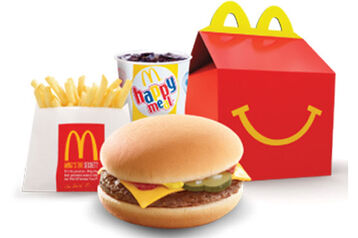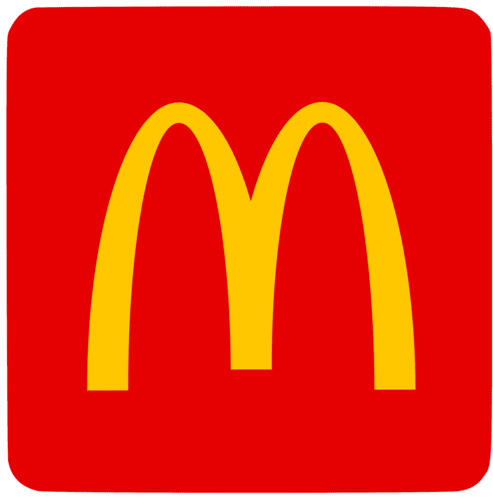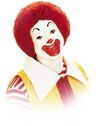(Editing a gallery) |
(→History: added info) Tag: Visual edit |
||
| (16 intermediate revisions by 11 users not shown) | |||
| Line 1: | Line 1: | ||
| − | {{Infobox Menu Item|image = [[File: |
+ | {{Infobox Menu Item|image = [[File:428058 28985777.jpg|thumb|358px]]|caption = Happy Meal|type = Meal|markets = Global|creator = Yolanda Fernández de Cofiño (Original Concept) |
| + | Developed to final product by Robert Bernstein|introduced = 1979}} |
||
| − | - |
||
| + | |||
| − | + | A '''Happy Meal''' is a form of kids meal specifically marketed at children, sold at the fast-food chain [[McDonald's]] since June 1979. A toy is typically included with the food, both of which are usually contained in a box with the McDonald's logo. The packaging and toy are frequently part of a marketing tie-in to an existing TV show, film, or toy line. |
|
==Product description== |
==Product description== |
||
| − | The Happy Meal contains a main item |
+ | The Happy Meal contains a main item typically a [[hamburger]], [[cheeseburger]], or small serving of [[Chicken McNuggets]], a side item [[french fries]], [[apple slices]], or a salad in some areas, and a drink milk, juice, or a soft drink. The choice of items changes from country to country, and may depend on the size of the restaurant. |
| − | In most countries, McDonald's introduced a |
+ | In most countries, McDonald's introduced a healthy option to the Happy Meal. Children have always been able to choose milk with their Happy Meal and the chain added fruit juice drink instead of a soft drink, and bags of dried fruit or a whole piece of fruit such as an apple or carrot sticks in place of fries. |
===Variants=== |
===Variants=== |
||
| Line 11: | Line 12: | ||
===International naming=== |
===International naming=== |
||
| − | In some regions different names are used. In Quebec, it is called |
+ | In some regions different names are used. In Quebec, it is called Joyeux Festin literally meaning ''Happy Feast'' in French. In Latin America and Puerto Rico not so in Spain it is known as ''Cajita Feliz'' ''Happy little box'' in Spanish. In Brazil it is known as ''McLanche Feliz'' ''Happy McSnack'' in Portuguese. |
| − | In Japan, it was called ''Okosama Lunch'' from 1987 to 1988, then ''Okosama Set'' from 1988 to 1995 |
+ | In Japan, it was called ''Okosama Lunch'' from 1987 to 1988, then ''Okosama Set'' from 1988 to 1995 ''Okosama'' is a polite word for child, before being renamed to ''Happy Set.'' In Germany, it was known as ''Juniortüte'' ''Bag for Juniors'' in German until 1999. |
==History== |
==History== |
||
| − | In the mid- |
+ | In the mid-1970's Yolanda Fernández de Cofiño started working with her husband running McDonalds stores in Guatemala. She created what she called the Menu Ronald Ronald menu, which offered a hamburger, small fries and a small [[sundae]] to help mothers feed their children more effectively while at McDonald's stores. The concept was eventually brought to the attention of McDonald's management in Chicago. The company gave the development of the product to Bob Bernstein, founder and CEO of Bernstein-Rein Advertising, an agency that has counted McDonald's as a key client since 1967. Bernstein came up with the Happy Meal Bronze Happy Meal presented to Robert Bernstein crediting him with creation of the Happy Meal. In 1977 the McDonald's store owner clients who regularly met with Bernstein were looking for ways to create a better experience for families with kids. Bernstein reasoned that if kids could get a packaged meal all their own instead of just picking at their parent's food, everybody would be happier. He had often noticed his young son at the breakfast table poring over the various items on cereal boxes and thought, Why not do that for McDonald's? The package is the key! He called in his creative team and had them mock up some paperboard boxes fashioned to look like lunch pails with the McDonald's Golden Arches for handles. They called in nationally known children's illustrators and offered them the blank slate of filling the box's sides and tops with their own colorful ideas from art to jokes to games to comic strips to stories to fantasy whatever they thought might appeal to kids, at least 8 items per box. Inside the box would be a burger, small fries, packet of cookies and a surprise gift. A small drink would accompany. Bernstein named it The Happy Meal and it was successfully introduced with television and radio spots and in-store posters in the Kansas City market in October 1977. Other markets followed and the national roll out happened in 1979. |
| − | Often the Happy Meal is themed to promote a current family-oriented movie. The first such promotion was the '''[[Star Trek Meal]]''', to promote ''[[Star Trek: The Motion Picture]]'' in December 1979. The packaging used for the Star Trek Meal consisted of various images and games related to the film, as well as a comic strip adaptation of the film. Consumers had to buy numerous meals in order to complete the set. In 1992, McDonald's withdrew their range of Happy Meal toys for the movie ''[[Batman Returns]]'', after complaints from parents that the movie was unsuitable for children. |
+ | Often the Happy Meal is themed to promote a current family-oriented movie. The first such promotion was the '''[[Star Trek Meal]]''', to promote ''[[Star Trek: The Motion Picture|Star Trek The Motion Picture]]'' in December 1979. The packaging used for the Star Trek Meal consisted of various images and games related to the film, as well as a comic strip adaptation of the film. Consumers had to buy numerous meals in order to complete the set. In 1992, McDonald's withdrew their range of Happy Meal toys for the movie ''[[Batman Returns]]'', after complaints from parents that the movie was unsuitable for children. |
| − | In July 2011, McDonald's announced plans to make Happy Meals healthier, including the addition of apples. The redesigned meals will contain a smaller portion |
+ | In July 2011, McDonald's announced plans to make Happy Meals healthier, including the addition of apples. The redesigned meals will contain a smaller portion 1.1 ounces of fries, along with the apples. On February 4, 2013, McDonald's announced that [[Fish McBites]], fried Alaskan pollock, the same fish used in [[Filet-O-Fish]], will be added as an entree, which will run until March, intended to coincide with Lent. |
In 2014, a new mascot for the Happy Meal was introduced, named [[Happy]]. |
In 2014, a new mascot for the Happy Meal was introduced, named [[Happy]]. |
||
| + | |||
| + | There was a push within McDonald's to refuse Happy Meals for adults who didn't have children with them, as they viewed it as "creepy". This policy was briefly tested in a few markets in North America, but it lead to armed standoffs with angry and violent patrons. |
||
== Happy Meal toy == |
== Happy Meal toy == |
||
| − | The Happy Meal did not introduce the practice of providing small toys to children. In [[Canada]], the promotion prior to the Happy Meal was called the |
+ | The Happy Meal did not introduce the practice of providing small toys to children. In [[Canada]], the promotion prior to the Happy Meal was called the Treat of the Week, where a different toy was available free on request each week. This promotion continued after the Happy Meal was introduced in 1979. Happy Meal toys have become increasingly elaborate in recent years. While initially they were little more than a cheap plastic trinket such as a Frisbee or ball, they have gradually been replaced with increasingly sophisticated toys, many of which are a tie-in to an existing TV show, film, or toy line. From 1988 to 2007, this was usually a Disney movie (Disney movie themes had also been used earlier, but sporadically). However, DreamWorks did renew the contract, wishing to use their characters to promote healthier foods. |
==Gallery== |
==Gallery== |
||
| ⚫ | |||
| − | <gallery> |
||
| − | File:IMG_5382.png |
||
| − | 428058 28985777.jpg |
||
| − | 7485447.54722d666daba.jpg |
||
| − | File:20150626205338.png |
||
| − | File:636412585465980649-XXX-MCDONALDS-HAPPY-MEAL-64343032.jpg |
||
| − | File:Ap110725132481-64efa1b0559d2ba8f38c7f6aaa9b96221806903b-s800-c85.png |
||
| − | File:H-mcdonalds-Hamburger.png |
||
| − | File:Happy_Meal_2004.png |
||
| − | File:Happy-meal-mcdonalds.jpg |
||
| − | File:Happy-meal-300x225.png |
||
| − | File:Happymeal.jpg|thumb |
||
| − | File:HappyMeal_Logo-1-.jpg |
||
| − | File:Mcdonalds.5a8719538d0bc.jpg |
||
| − | File:R8drasutvz2oqr1w2bea.jpg |
||
| − | File:Unknown.jpg |
||
| − | New McDonald's Happy Meal design for the 1997 My McDonald's rebrand.png|In 2025 McDonald's will introduce a new Happy Meal Box design created by Patrick William Rich with Ronald and the Happy Meal gang |
||
| ⚫ | |||
==See also== |
==See also== |
||
Revision as of 18:04, 4 May 2020
| Happy Meal | |
|---|---|
[[ Happy Meal | |
| Type | Meal |
| Created by | Yolanda Fernández de Cofiño (Original Concept)
Developed to final product by Robert Bernstein |
| Date of introduction | 1979 |
| Markets sold | Global |
A Happy Meal is a form of kids meal specifically marketed at children, sold at the fast-food chain McDonald's since June 1979. A toy is typically included with the food, both of which are usually contained in a box with the McDonald's logo. The packaging and toy are frequently part of a marketing tie-in to an existing TV show, film, or toy line.
Product description
The Happy Meal contains a main item typically a hamburger, cheeseburger, or small serving of Chicken McNuggets, a side item french fries, apple slices, or a salad in some areas, and a drink milk, juice, or a soft drink. The choice of items changes from country to country, and may depend on the size of the restaurant.
In most countries, McDonald's introduced a healthy option to the Happy Meal. Children have always been able to choose milk with their Happy Meal and the chain added fruit juice drink instead of a soft drink, and bags of dried fruit or a whole piece of fruit such as an apple or carrot sticks in place of fries.
Variants
- Main article Mighty Kids Meal
International naming
In some regions different names are used. In Quebec, it is called Joyeux Festin literally meaning Happy Feast in French. In Latin America and Puerto Rico not so in Spain it is known as Cajita Feliz Happy little box in Spanish. In Brazil it is known as McLanche Feliz Happy McSnack in Portuguese.
In Japan, it was called Okosama Lunch from 1987 to 1988, then Okosama Set from 1988 to 1995 Okosama is a polite word for child, before being renamed to Happy Set. In Germany, it was known as Juniortüte Bag for Juniors in German until 1999.
History
In the mid-1970's Yolanda Fernández de Cofiño started working with her husband running McDonalds stores in Guatemala. She created what she called the Menu Ronald Ronald menu, which offered a hamburger, small fries and a small sundae to help mothers feed their children more effectively while at McDonald's stores. The concept was eventually brought to the attention of McDonald's management in Chicago. The company gave the development of the product to Bob Bernstein, founder and CEO of Bernstein-Rein Advertising, an agency that has counted McDonald's as a key client since 1967. Bernstein came up with the Happy Meal Bronze Happy Meal presented to Robert Bernstein crediting him with creation of the Happy Meal. In 1977 the McDonald's store owner clients who regularly met with Bernstein were looking for ways to create a better experience for families with kids. Bernstein reasoned that if kids could get a packaged meal all their own instead of just picking at their parent's food, everybody would be happier. He had often noticed his young son at the breakfast table poring over the various items on cereal boxes and thought, Why not do that for McDonald's? The package is the key! He called in his creative team and had them mock up some paperboard boxes fashioned to look like lunch pails with the McDonald's Golden Arches for handles. They called in nationally known children's illustrators and offered them the blank slate of filling the box's sides and tops with their own colorful ideas from art to jokes to games to comic strips to stories to fantasy whatever they thought might appeal to kids, at least 8 items per box. Inside the box would be a burger, small fries, packet of cookies and a surprise gift. A small drink would accompany. Bernstein named it The Happy Meal and it was successfully introduced with television and radio spots and in-store posters in the Kansas City market in October 1977. Other markets followed and the national roll out happened in 1979.
Often the Happy Meal is themed to promote a current family-oriented movie. The first such promotion was the Star Trek Meal, to promote Star Trek The Motion Picture in December 1979. The packaging used for the Star Trek Meal consisted of various images and games related to the film, as well as a comic strip adaptation of the film. Consumers had to buy numerous meals in order to complete the set. In 1992, McDonald's withdrew their range of Happy Meal toys for the movie Batman Returns, after complaints from parents that the movie was unsuitable for children.
In July 2011, McDonald's announced plans to make Happy Meals healthier, including the addition of apples. The redesigned meals will contain a smaller portion 1.1 ounces of fries, along with the apples. On February 4, 2013, McDonald's announced that Fish McBites, fried Alaskan pollock, the same fish used in Filet-O-Fish, will be added as an entree, which will run until March, intended to coincide with Lent.
In 2014, a new mascot for the Happy Meal was introduced, named Happy.
There was a push within McDonald's to refuse Happy Meals for adults who didn't have children with them, as they viewed it as "creepy". This policy was briefly tested in a few markets in North America, but it lead to armed standoffs with angry and violent patrons.
Happy Meal toy
The Happy Meal did not introduce the practice of providing small toys to children. In Canada, the promotion prior to the Happy Meal was called the Treat of the Week, where a different toy was available free on request each week. This promotion continued after the Happy Meal was introduced in 1979. Happy Meal toys have become increasingly elaborate in recent years. While initially they were little more than a cheap plastic trinket such as a Frisbee or ball, they have gradually been replaced with increasingly sophisticated toys, many of which are a tie-in to an existing TV show, film, or toy line. From 1988 to 2007, this was usually a Disney movie (Disney movie themes had also been used earlier, but sporadically). However, DreamWorks did renew the contract, wishing to use their characters to promote healthier foods.
Gallery
|
To view the Happy Meal gallery, click here. |
See also
- Happy Meal/List of toys

